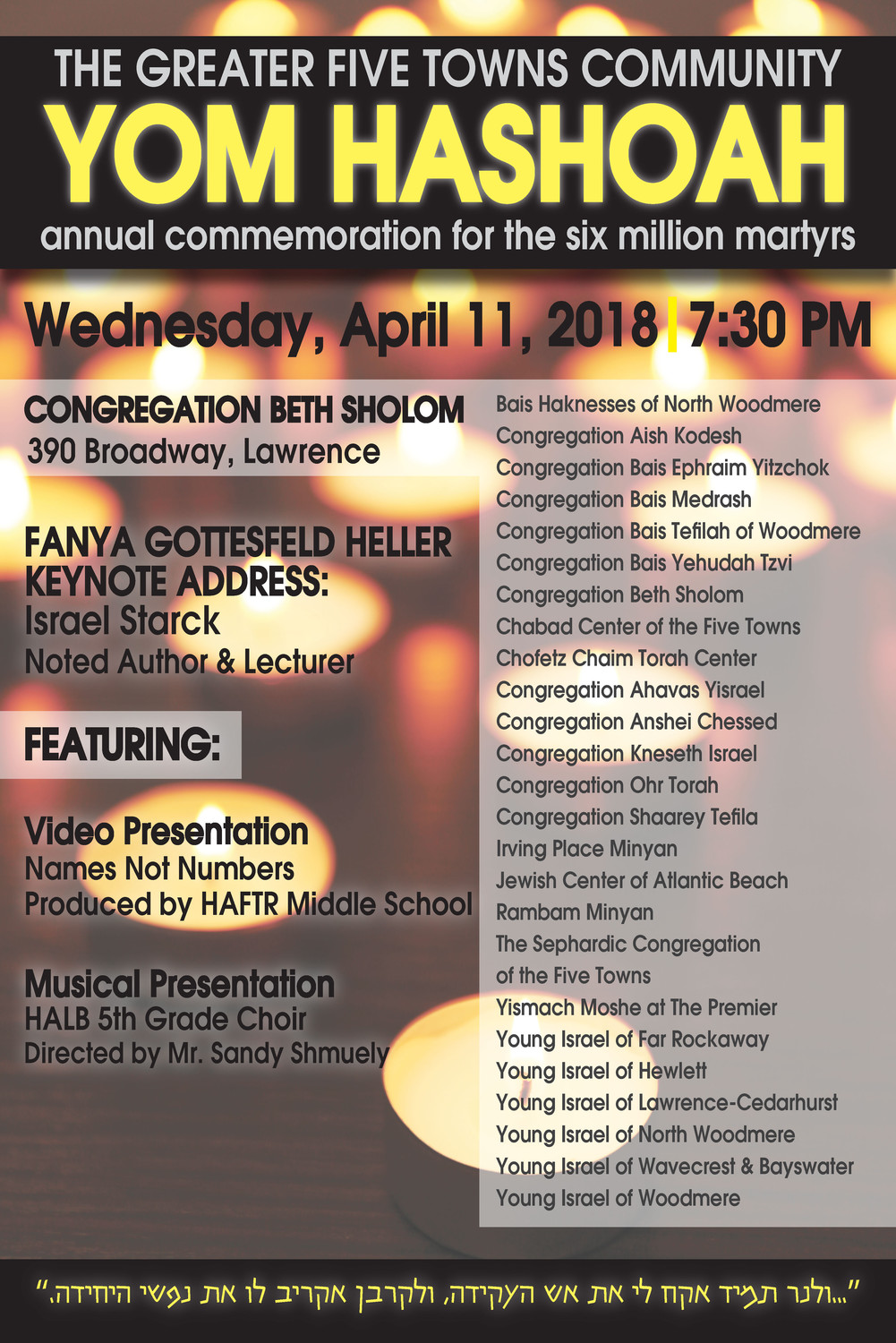‘We’re not going to die’
Holocaust remembrance highlights Jewish survival
Posted
Remembering survivors, keeping history and its lessons alive, continuing to battle anti-Semitism and celebrating the 70th anniversary of Israel will all intertwine when Yom Hashoah — Holocaust Remembrance Day — is commemorated on April 12 in the U.S. and Israel.
The date corresponds to the Warsaw Ghetto uprising in 1943, when Jewish residents battled Nazi forces for nearly a month that April and May. Though the German forces crushed the 27-day resistance, it remains a symbol of Jewish courage.
For more than 20 years, the annual Greater Five Towns Community Yom Hashoah has brought synagogues and schools together. The event will once again take place at Congregation Beth Sholom, at 390 Broadway in Lawrence, on April 11 at 7:30 p.m.
“Having the younger generation hear the firsthand accounts of what happened, and how these amazing individuals survived those atrocities and went on to rebuild their lives, is an invaluable lesson that they in turn will need to pass on to their own children and grandchildren,” said Nathaniel Rogoff, who, along with Dana Frenkel, both Woodmere residents, organize the event. Frenkel’s grandparents were Holocaust survivors, and Rogoff’s grandparents had several close friends who survived Ausch-witz, one of the more infamous concentration camps.
The celebration will include 26 shuls, and will feature a keynote address by Israel Starck, a noted author and lecturer; a video presentation of “Names Not Numbers,” a project undertaken by students from the Hebrew Academy of the Five Towns, Rockaway Middle School and Lawrence Middle School; and a performance by the fifth-grade choir from the Hebrew Academy of Long Beach.
“Remembering the Holocaust increases in importance each year as we grow in distance from the actual events that took place in the Shoah,” Frenkel said. “As we lose more eyewitnesses to the extreme anti-Semitism, hatred and evil that was experienced by our people, our task of remembering increases in its significance.”
Revenge on the Nazis
Shortly after Holocaust Remembrance day last year, Rabbi Nochem Tenenboim posted text and a photo of five women — his paternal grandmother, three aunts and an unidentified woman — on Facebook, and posted, “These 4 courageous girls built beautiful families with hundreds of grandchildren and great-grandchildren. Many of them Jewish leaders around the world making sure that ‘Am Israel Chai’ — the people of Israel are alive!”
Calling himself a survivor, Tenenboim, 34, the spiritual leader of the Chabad of Hewlett, said that his grandfather, Meir Tenenboim, was the only one to survive from a family of 11. His grandmother, Toiba Tenenboim, had nine siblings, and she, three sisters and one brother survived the Holocaust.
“After seeing the picture, I learned more about it,” the rabbi said. “They lived in Hungary. They came into the game very, very late. They believed it would not happen there. There was always anti-Semitism in Hungary, but they knew how to live there.”
The family was first taken to the Bicske ghetto, then shipped to Auschwitz. “[Dr. Josef] Mengele was there,” Tenenboim said, referring to the man who was called “the angel of death” for his role in choosing who went to the gas chambers and who underwent medical experiments that usually ended in death.
Connecting what he called a “true miracle” of survival to the Jewish holiday of Passover, Tenenboim said that the song “Vehi Sheamda,” from the Haggadah, the book that guides the Seder meal, includes the refrain, “For, not only one arose and tried to destroy us, rather in every generation they try to destroy us, and Hashem [God] saves us from their hands.” After the Holocaust, a custom was added to the Seder: an empty chair is set aside to remember the children who died, and could never again celebrate the Jewish holiday that commemorates freedom. Passover this year began on March 30 and ends on April 7.
“Toward the end of their time in Auschwitz,” Tenenboim said of his grandmother and aunts, “they actually did go to the gas chamber. They were all naked, waiting and knew already what’s going to happen. For some reason, there was no gas. They never found out why. After six hours of sitting quiet, [the German soldiers] sent everyone out. This is a true miracle to all of us.”
Earlier in their time at Auschwitz, one of the sisters had said, “We’re going to die,” Tenenboim recounted. “My grandmother, the oldest, slapped her and said, ‘We’re not going to die, we’re going to live.’” His grandmother, he said, was upbeat enough to have the concentration camp numbers imprinted on her arm by the woman who did it the best.
After being liberated from Auschwitz, the sisters returned to Hungary. Encouraged to go to Israel, they married and had families that have produced more than 300 great-grandchildren, the rabbi said. “This picture gave me a link, a connection to history that is continuing now,” he said. “This is the continuation of Judaism. That hall had the strength to marry. This is the revenge against the Nazis.”
Anti-Semitism remains
The Jewish state turns 70 this year. Frenkel and Rogoff both noted that anti-Semitism remains an issue. “[A week ago] an 85-year-old French woman” — Mireille Knoll — “who survived the Holocaust was brutally murdered because she was a Jew,” Rogoff said, adding that the younger generation should “marvel in the amazing strength of the survivors.” “Seventy years of the state of Israel is a testament to their never-ending faith and will to survive.”
With a 90 percent increase in anti-Semitic incidents in New York state and a 57 percent jump nationwide in 2017, according to the Anti-Defamation League, Frenkel said she believes “that we still have work to do and lessons remain to be learned.” “The existence of Israel gives me great comfort,” she said. “But we must remain steadfast in our resolve to remember the atrocities perpetrated against our parents and grandparents.”
Report an inappropriate comment
Comments









